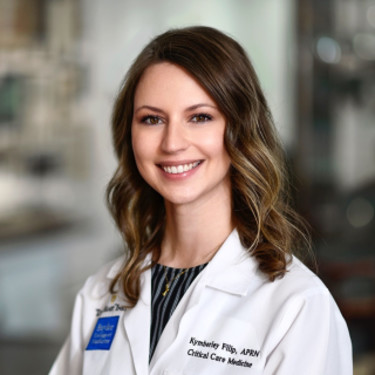“Hey, Kym, can you come and take a look at this patient? Something feels off. The fellow said they were fine but my gut is telling me otherwise.”
One thing I have learned in my experience is when an ICU nurse is concerned, nine times out of ten their intuition is correct. I quickly made my way over to the room where a post-cath lab patient was boarded.
The patient had several blockages in his coronary arteries that were opened up by stenting the day prior. When I approached, his heart rate was only mildly elevated from earlier in the day and he was now on 2 liters of oxygen compared to ambient air — a small change but an important one. In addition, his systolic blood pressure had been trending down, but not dramatically enough to cause immediate concern for treatment. Also, when I felt the patient's skin, it was cool to the touch and clammy.
My mind began to process the most likely scenarios for these minute changes. Intuition was telling me the patient was developing cardiogenic shock. I decided to order several stat labs, grab the portable ultrasound machine on the unit, and call my attending to assess the patient. Sure enough, the patient’s heart wasn’t “squeezing” effectively and his body had increasing amounts of lactic acid building up. Within the next hour, he had to have an intra aortic balloon pump placed and was rushed back to the cath lab.
The example above illustrates the importance of having NPs and PAs (also known as APPs) on staff in an ICU. Though our physician colleagues in training bring in a wealth of knowledge, there is a unique perspective the APP is able to offer. For instance, many seasoned clinicians know that experience with hands-on patient care is key. Pattern recognition and instincts take time to build, and newer physician learners may not have developed these skills yet.
Nevertheless, new residents or patients often ask: “Why is an APP necessary? Are they really needed when there are many fellows and residents?” To a certain extent, I understand where this is coming from. In an academic hospital, there are many learners from multiple health care disciplines at all times. Fellows, residents, medical students … the list is endless. However, in our hospital, the APPs have a crucial role: In addition to managing their own patients, they are often the ones to assist in training fellows and helping clarify the flow of the ICU. The APP may have more time to give hands-on teaching than a busier supervising attending physician managing a fully bedded ICU and dividing their time among all trainees.
In an academic hospital, APPs typically staff the same intensive care unit. They are often sub-specialized into surgical ICU, cardiac ICU, cardiovascular ICU, neuro ICU, medical ICU, and so on. These APPs have spent years on these specialty units and have developed an in-depth understanding of the specific patient populations. Time and repetition has made them equipped to notice slight changes that may be evidence of a larger issue or decline in the patient’s health status that a physician in training may not be able to yet.
Another added benefit of having an APP in the ICU is continuity of care. For most academic hospitals, residents and fellows rotate their service lines each month through the same hospital or several different hospitals. The APP will continue to work in their respective ICU and follow the patient until their need for a critical care admission has ended. Several studies have shown additional benefits of having APPs in ICUs, which include but are not limited to reduced mortality; increased communication with all health care disciplines; and improved charge capture, which improves hospital revenue. Our unique training and experience helps us to bridge the gap between the nursing world and the physician world.
By no means does an APP role replace a physician role, but it is beneficial to the patient and to learners at every level to work with each other, as we all offer unique perspectives to treating patients.
After we rallied as a team to treat the patient in cardiogenic shock, we debriefed and discussed why I noticed more quickly that the patient was decompensating. I explained how I learned to recognize the signs of decompensation over years of first-hand experience and pattern recognition with disease processes specific to my cardiac ICU, something my colleagues had not yet learned given their lack of exposure to the warning signs of cardiogenic shock.
Scenarios such as these are learning opportunities for all involved. The residents, fellows, and attending physicians teach the APPs daily, and we teach them in return. Once we recognize it is all in the interest of patient care, egos can be moved aside and growth can happen.
What role do APPs play in your ICU? Share in the comments!
Kymberley Armstrong is an ICU Nurse Practitioner in Houston, TX at Baylor College of Medicine. She has been taking care of critically ill patients for over seven years. Born and raised in Texas, she attended The University of Texas at Austin and is an avid Longhorn fan. Kymberley is a 2023–2024 Doximity Op-Med Fellow.
Image by GoodStudio / Shutterstock





